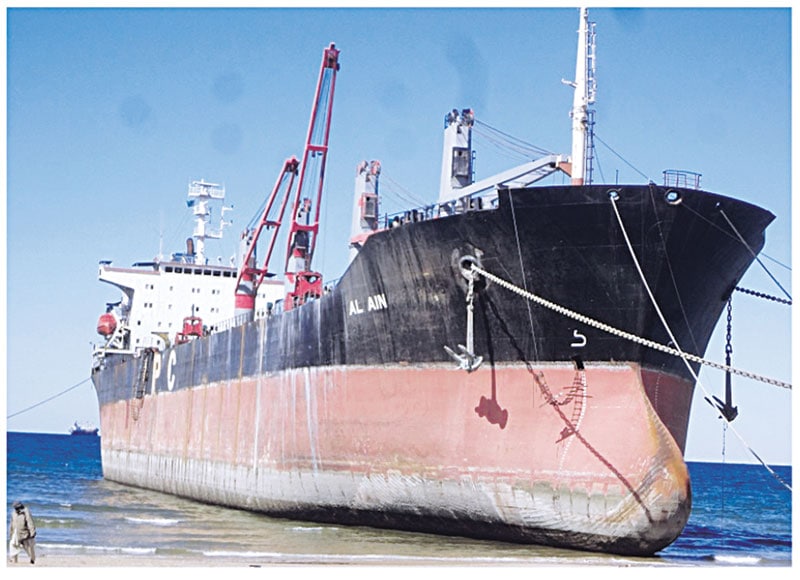VICE ADMIRAL (RETD) AHMED SAEED HI(M) PRESIDENT, NATIONAL INSTITUTE OF MARITIME AFFAIRS, PAKISTAN
The ship recycling industry holds a vital role in the global maritime sector. With an estimated 108,787 ships currently in operation, the demand for retiring ageing vessels has intensified due to international regulations like decarbonisation goals and the International Maritime Organization’s (IMO) energy efficiency measures (EEXI and CII). Historically, vessels had an average lifespan of 27.5 years, but now this has been reduced to 15-25 years. As such, ship recycling has become a crucial requirement for maintaining the global maritime balance, promoting sustainability, and supporting national economies by phasing out inefficient ships and recovering valuable materials, particularly steel.
The next decade is poised for significant growth in the ship recycling industry. Between 2024 and 2035, the market is expected to expand as more vessels are retired. Short-term projections suggest that by 2025, between 5-10% of the global fleet or over 800 ships will be retired, with this figure rising to as many as 1,500 ships annually by 2028. By 2035, an estimated 15,000 ships, or 12.5% of the global fleet, will need to be recycled.
Currently, global ship recycling capacity is around 12 million LDT (Light Displacement Tons) annually. However, this capacity may become insufficient by 2026, as a 3% ship retirement rate could create a shortfall of 1.75 million LDT, potentially increasing to 3.25 million LDT by 2030. Innovations in recycling processes could generate economic benefits of approximately USD 4.5 trillion by 2030, demonstrating the sector’s growth potential.

Despite its potential, shipbreaking remains one of the most hazardous occupations globally. According to the International Labour Organization (ILO), workers in this sector face high levels of fatalities, injuries, and exposure to hazardous materials like asbestos, heavy metals, and PCBs. This is especially prevalent in the ship recycling hubs of Pakistan, Bangladesh, and India.
To address these issues, the “Decent Work” concept outlined in UNSDG Goal 8 is being integrated into the industry. It emphasises safer working environments, better health protections, and improved governance. By focusing on occupational safety and better labour conditions, the ship recycling industry can become more sustainable and responsible.
Ship recycling is closely aligned with the principles of the circular economy. The process recovers valuable materials, particularly steel, reducing the need for new raw materials and conserving natural resources. Recycled steel is also crucial for reducing greenhouse gas emissions and generating tradeable carbon credits, further encouraging sustainable practices.
The global steel demand is expected to reach 2.2 billion metric tons by 2032, with Pakistan’s share estimated at 21.5 million tons. A robust ship recycling industry can meet much of this domestic demand, reducing dependence on imports while also positioning Pakistan as a potential exporter of steel. Furthermore, the environmental benefits of recycled steel align with global sustainability goals, making Pakistan’s ship recycling industry a key contributor to reducing emissions and conserving resources.
Historically, Pakistan has been a major player in global ship recycling, particularly at its Gadani Shipbreaking Yards. Spread over 1,256 acres, with 135 shipbreaking plots, Gadani was one of the largest shipbreaking centres globally. Between 2014 and 2023, 7,150 ships were dismantled globally, with 4,912 of these scrapped in South Asia. Pakistan accounted for 16.8% of this total, reinforcing its importance in the region.
Unfortunately, the industry has faced significant challenges in recent years. In 2023, Gadani dismantled only 15 ships, marking one of its worst performances in the last decade. The decline is attributed to several factors: inadequate regulatory oversight, weak governance, safety omissions, environmental issues, insufficient formal training, and the failure to meet international standards for safety and sustainability.
The Hong Kong International Convention (HKC), adopted by the IMO in 2009, aims to establish a legally binding framework for safe and environmentally sound ship recycling practices. Pakistan officially acceded to the HKC on November 30, 2023, becoming the 23rd member state. The convention is set to take effect on June 26, 2025, offering Pakistan an opportunity to reform its shipbreaking industry.
Achieving compliance with HKC standards will require addressing several critical challenges:
- Pakistan currently lacks a comprehensive legal framework to enforce HKC standards. Developing national legislation is crucial for promoting sustainable practices and ensuring compliance.
- The creation of a National Ship Recycling Authority, alongside the Balochistan Green Ship Recycling Board (BGSRB) and a Government One-Stop Service (GOSS), is essential for improving compliance and ensuring that industry practices align with HKC requirements.
- Poor safety protocols, lack of Personal Protective Equipment (PPE), and inadequate training have contributed to hazardous working conditions. Investing in safety training and providing proper equipment are necessary to protect workers and ensure HKC compliance.
- Gadani suffers from significant environmental challenges, including poor hazardous waste management and pollution. Developing a Sustainable Ship Recycling Code based on IMO guidelines is critical for addressing these issues and promoting responsible practices.
- Gadani’s infrastructure is outdated, lacking essential healthcare facilities, training centres, and adequate road networks. Upgrading these facilities is vital for ensuring operational efficiency and protecting workers.
To secure the long-term viability of its ship recycling industry, Pakistan must take immediate steps to comply with HKC standards. This includes:
- Developing a comprehensive regulatory framework and establishing a National Ship Recycling Authority to oversee operations are essential for promoting sustainable practices.
- Implementing training programs to enhance worker safety and providing PPE are crucial for ensuring that workers are protected and the industry remains sustainable.
- Gadani’s infrastructure needs significant upgrades, including the development of modern recycling facilities, healthcare services, and proper waste management systems.
- Pakistan must collaborate with international partners such as the IMO, ILO, and NORAD to secure technical expertise and financial support for these reforms.
NIMA’s International Maritime Symposium on the Blue Economy and SDGs emphasizes sustainable maritime practices. Compliance with HKC standards could boost Pakistan’s ship recycling revenue by 30% and capacity by 40%. Aligning with international standards enhances global competitiveness, fostering growth, investment, and sustainability. Through safety, collaboration, and environmental stewardship, Pakistan can lead in the global ship recycling industry.
The Gadani Shipbreaking Industry stands at a crossroads. With the HKC set to come into effect in June 2025, Pakistan must act swiftly to reform its industry or risk falling further behind. By implementing regulatory reforms, upgrading infrastructure, and focusing on safety and environmental protection, Pakistan can transform its ship recycling sector into a globally competitive and sustainable industry. Through strategic investments and international collaboration, Pakistan can ensure its ship recycling industry contributes to economic growth and environmental sustainability, securing a prosperous future in the global maritime sector.










